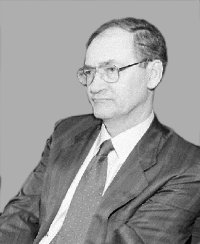Belgian Ambassador Pierre VAESEN : “Traditions are no obstacle to pluralism”

The Kingdom of Belgium celebrated its national holiday, the Day of the King, two weeks ago. Several days later the subjects of His Royal Highness Albert II rose flutes of champagne to toast Crown Prince Philip and his fiancйe Mathilde d'Udekem d'Acoz. Monsieur Pierre Vaesen, Ambassador Extraordinary and Plenipotentiary of the Kingdom of Belgium to Ukraine, graciously agreed to tell us about his country's significant developments and progress in Belgian-Ukrainian relationships.
The Day: The Kingdom of Belgium is known for its unswervingly traditional lifestyle and order. Considering the most recent developments, this stereotypic approach to your country could become universal in ours.
P. V.: Our current King is at the same time the symbol of our precious traditions but also of a democratic country clearly oriented towards social and economic progress. The King's Day has been traditionally celebrated on November 15, in remembrance of our first King, Leopold I. We also have a National day on July 21, which commemorated the accession to the throne of the same King Leopold in 1831. Official functions and religious services are celebrated on those days, but there are also public and festive events, like concerts, fire-works. Besides these two official days, we also have holidays for important religious celebrations like Christmas and Easter. May Day is also a day off and called Labor Day. This has been set up by the socialist party, which organizes on that occasion peaceful demonstrations and festive events. As you see, our holidays reflect an interesting pluralism in our society.
The Day: December 4 saw the wedding of Crown-Prince Philip, the first wedding of a member of the Belgian Royal Family with a young lady of Belgian nationality.
P. V.: Things are changing and we are no more bound by rigid rules as before. In the past, royal marriages were based on diplomatic considerations, and often reflected political alliances. All this is over, fortunately. The marriages of King Baudouin with a member of the Spanish nobility, Fabiola de Mora y Aragon, in 1960, and of the present King Albert II with a Italian aristocrat, Paola di Ruffo di Calabria, in 1959, were already based on personal choice and inclination. Prince Philip is following the example set by his uncle Baudouin and by his father King Albert, but he is also innovating by getting married to a compatriot. Mathilde d'Udekem d'Acoz comes from a respectable aristocratic family and has an interesting professional background by being a speech therapist. We all hope that Prince Philip and Ms. Mathilde d'Udekem will make a happy couple.
The Day: We know that the royal family sponsors a number of cultural projects, among them the world-renowned Queen Elizabeth International Contest. This year the Grand Prix went to Vitaly Samoshko, a Ukrainian pianist. When was this contest founded and what are the terms and conditions?
P. V.: The contest was first held in 1938, on the initiative of the great Belgian virtuoso Eugene Ysaye supported by Queen Elizabeth, Albert II's grandmother. The contest was interrupted by World War II and renewed in 1951. Since then it has been held annually, in three categories : piano, violin, and vocal. The contestants must go through a qualifying round, each must have a post secondary musical education and experience in international contests. They vie for a month, with 10-15 usually making it into the finals and then the contest is held in earnest. They are all accommodated at a remote villa and provided every facility for practice. The organizing committee sees to it that they cannot listen to each other's performance. Their renditions are judged by an international jury. In addition to the Grand Prix (the Queen Fabiola Prize), they can receive five other prizes, issued respectively by the Federal Belgian Government, European Community, Belgian Society, and the Brussels Capital Region. After Queen Elizabeth's passing, since 1965, the contest has been under the patronage of Queen Fabiola who always attends the competition. The Queen presents the awards and the prestige of the event is evidenced by the fact that among its laureates on various occasions have been David Oistrach, Kateryna Novytska, Vladimir Ashkenazi, Pierre-Allen Volond, and Leon Fleischer. And now Vitaly Samoshko. This musician has a brilliant future, and it is all the more gratifying that the pianist made his name after his triumphant performance in Brussels. On November 26 our Embassy organized Samoshko's solo concert at the National Musical Academy of Ukraine. I do hope that this concert will be the harbinger of expanded cultural exchanges between our countries.
The Day: Monsieur Vaesen, you have worked in Ukraine for the past year. Would you please tell us about your impressions? What issues do you consider to have priority in Ukrainian-Belgian relationships?
P. V.: I am very fond of Ukraine, I admire your people, architectural sites, and your landscapes. There are many places of interest in the different regions. I think that your country should pay more attention to international tourism. A general educational program stipulating teacher-student exchanges has been underway between Ukraine and Flanders for the past five years among other in the field of hotel-training. Joint ventures specializing in different sectors of the economy are founded in several regions. I hope that Ukraine and Belgium will become partners in many spheres of mutual interest.
Выпуск газеты №: Section






